Michal Karmi

The rising economic and environmental cost of fossil fuels will greatly affect our reliance on them for global food transportation in the near future. Michal will design crop plans for plant-based food systems in Israel and Ireland — regions with radically different climates — to determine the feasibility of maintaining a locally grown, healthy plant-based diet. This summer, she will conduct research in Israel and Ireland, collecting technical evidence of soil and climate conditions to determine what can be grown in each area, gathering historical data on plant foods grown […]
S. Zayd Enam
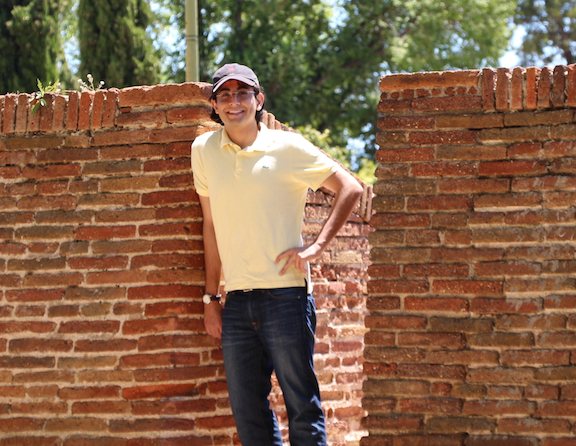
In this project we plan on using parallelized computation to build realistic sparse coding models for neurons in the primary visual cortex (V1). Sparse coding is a stimulus encoding technique used by V1 neurons that aims to minimize the number active neurons required in encoding any input image. Due to computational constraints, previous sparse coding models have been limited in their ability to match the biology of lateral geniculate nucleus projections to V1. Our models will allow us to better describe recorded biological data and provide further evidence that V1 […]
Katya Cherukumilli
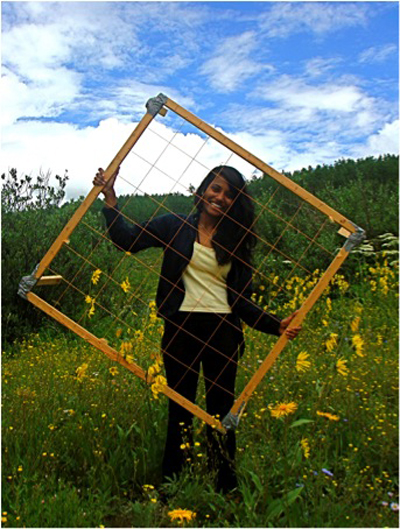
Since the early 20th century, global surface temperatures have risen 1.4F, with the majority of the warming occurring in the past three decades due to anthropogenic activities. Significant changes in sea level, ecosystems, and ice cover are predicted to occur as a result of increasing temperatures. Katya aims to understand ecological responses to simulated and natural climate change in a subalpine meadow at the Rocky Mountain Biological Laboratory. She will maintain a database for the longest-running climate manipulation experiment in the world and gather additional information about the species abundance […]
Elizabeth Nicole Wilcut
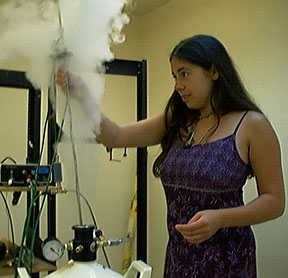
Elizabeth plans to design, construct and test a prototype of a low temperature refrigerator, in order to demonstrate an efficient and simple method for cooling to temperatures below 1 Kelvin. Currently, dilution refrigerators are used to achieve such low temperatures, a technology that is complicated, expensive and experimentally demanding. By pioneering the use of a refrigerator that uses a flowing electrical current through superconductor junctions, Elizabeth’s prototype will improve on the cooling power of some preliminary electronic refrigerators by more than four orders of magnitude and create a technology that […]
John Weedin

A double major in Molecular & Cell Biology and History, John intends to investigate the function of polysialic acid (PSA) on the cellular membranes of cancer cells. Polysialic acid is a relatively long, negatively charged sugar polymer composed only of sialic acid monomers. While the role of polysialic acid in neural and fetal cells has been well studied, information regarding its role in tumor cells has not. John hypothesizes that the long molecule disrupts the cell-cell interactions that prevent uncontrolled cell division, allowing tumor cells to rapidly multiply and expand. […]
Manasa Basavapatna
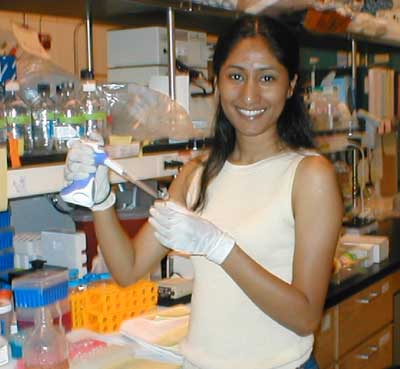
A Molecular and Cell Biology major, Manasa will study the Dengue virus (DEN), which causes the most prevalent arthropod-borne viral illness in humans worldwide, with an estimated 2.5 billion people at risk. Primary infection results in dengue fever (DF), an acute disease. In primary infections, DEN induces an effective immune response that may involve interferons (IFNs). IFNs are proteins produced by cells in response to various stimuli, especially viral infections, and are known for their antiviral and immunomodulatory effects. The role for IFNs in offering protection against the dengue virus […]
Nika Cyrus
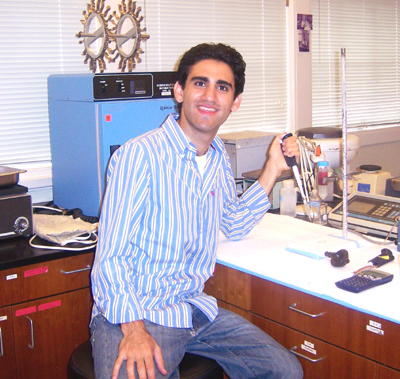
Folate deficiency still remains as the primary culprit for childhood mortality, and a major cause of atherosclerosis and cancer. Yet, we lack a precise method for determination of the long-term folate status of patients. The objective of Nikas project is to develop a more accurate method of quantifying long-term folate status through elucidation of Red Cell Folate kinetics. It is assumed that Red Cell folate (RCF) remains constant in the circulation; nevertheless, erythrocytes are capable of specific uptake of folate, suggesting that RCF is dynamic. Nika will perform experiments in […]
Ki Won Yoon
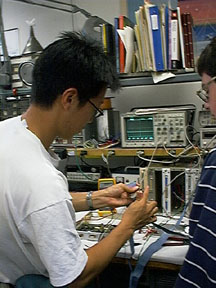
Ki Won’s project involves an investigation of cosmic microwave background radiation (CMBR). CMBR travels to us over cosmic distances, beginning its journey a short time after the Big Bang, the birth of the Universe. In essence, it is a snapshot of the aftermath of creation. Specifically, Ki Won will study the polarization characteristics of CMBR, using a polarization-capable radio telescope being built at the Lawrence Berkeley National Laboratory. Ki Won will develop a detailed plan for the use of the telescope to detect CMBR polarization, write software to automate the […]
Aida Sadikovic

Aida’s Senior Honors Thesis in Molecular & Cell Biology will focus on investigating the mechanisms behind the murine immune response to Listeria monocytogenes. L. monocytogenes is a ubiquitous intracellular human and animal pathogen that can spread from cell to cell via actin-based motility. Previous studies have shown that VASP-binding deficient strains of L. monocytogenes exhibit slow motility and virulence attenuation compared to wild type strains, especially in the liver during secondary murine listeriosis. She hopes to gain a better understanding of the reasons behind this tissue difference and to determine […]
Lorraine M. Wang
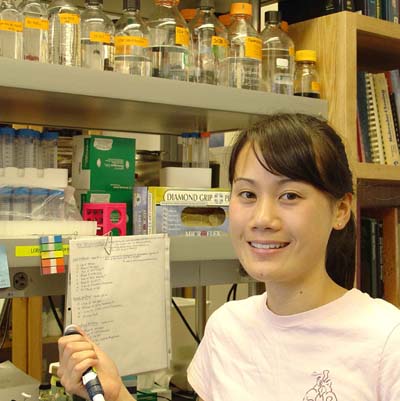
The ability of cells to respond to extracellular signals is mediated by signal transduction networks that almost invariably include a cascade of protein kinases. One family of protein kinases that is universally conserved in eukaryotes is called the p21-activated protein kinases (PAKs). The genome of Saccharomyces cerevisiae has revealed a closely related PAK-type protein kinase called Cla4. Cla4 is required for the proper assembly of a novel cytoskeletal structure that is essential for cytokinesis thereby providing an important checkpoint in the highly regulated cell cycle. Lorraine will be investigating the […]